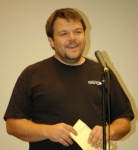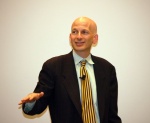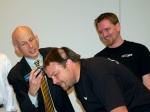
I'm sitting in the Salt Palace in Salt Lake, waiting for Seth Godin to show up. He's reportedly in the car, driving from the airport. That's OK, the wait time has been a great time for talking to friends I don't see all the time. There's probably 350 people here as we get started.
The premise for this event is interesting. Seth is promoting his new book, The Dip. I wrote about it back in April. He will come anywhere people agree to buy 2500 copies of his book. This is just the sort of fascinating Internet marketing that Seth Godin is famous for. An amazing way to sell some books and, more importantly, get his message out. I probably wouldn't have blogged about his book otherwise.
Phil Burns welcomes Seth (click to enlarge) |
This month Seth will go to 15 cities, each of which bought at least 2500 books. That's at least 37500 books! What does it take to get on the NY Times Best Seller list? Of course he also has his base. The buzz this marketing method has generated is what's important.
Seth doesn't use slides. He starts out talking about quitting. That's the topic of The Dip. People quit all the time. No one's ever written a book about quitting. He wants to start a conversation about quitting. That's why he makes people buy 5 copies of the book, so we'll give him away and start a conversation.
"Quitters never win and winners never quit" is not true. Winners quit all the time. And quitters win.
What made the Mona Lisa the most famous painting in the world? It got stoeln in 1912 and was missing for eight years. This was coincident with the rise of a paper in France that has 2 million subscribers. The Mona Lisa was in the news almost every day for eight years. He gives other examples of "superstars."
Seth
Godin (click to enlarge) |
There's a superstar shortage. A world wide shortage. There are plenty in pop music and other area, but not in areas that everyone cares about. There are plenty of niches. The Internet makes it possible for niches to be smaller and this leads to more slots for superstars.
What does "best" mean when Seth says "best in the world?" It's not a hard metric. We know what's not the best. Don't try to be more average than the average guy. Netflix is the best--not because a dozen guys in this room couldn't build something better. Because they fill the niche and do it well.
Best doesn't mean "the most expensive." The market decides who the best is.
Variety is the key to success. More varieties of ice cream is better than two. But vanilla ice cream outsells all other flavors combined. The number one draft pick adds $6 million to the bottom line of the team that gets him compared to the team that gets the number two.
This message is the opposite of the long tail. If you've got to have one blog, it's better to have the fat juicy head, not something on the tail.
The Dip is the place where people quit. Organic chemistry is the dip for doctors. The bar exam is the dip for lawyers. If it weren't for the dip, there'd be no scarcity.
Cumulative advantage is powerful. You get a little momentum and it starts to build. We're interested in what other people are interested in. Best seller lists are all about this. Google compounds this.
For one hundred years, we've organized around making average stuff for average people. Brand is about driving the cycle of average. There's so many products with so many ads, that people have given up.
If you're on the other side of the dip, there are huge wins. But the way you get to the other side is by doing something remarkable--not be being average and buying ads. People talk about the experience.
Reasons for quitting:
- You run out of time
- You run out of money
- You don't take your objective seriously enough
- You get scared and quit
- You're a switcher
- You've been trained to be average. This is the big one. He mentions public schools. They're geared to turn out average people.
- You don't have the talent. Seth doesn't agree with this one.
People who get through the dip put forth an unhealthy amount of effort and time at what they're doing because they are trying to be the best.
You can get "average" incredibly cheap (that's the whole outsourcing thing). You can't get "the best" cheap.
Companies are cluttering the world with products (19 versions of Oreos) because that's how you get mindshare in the world of "average." Lowering the price isn't the answer--that makes you more of a commodity.
Superstars don't have resumes. Superstars wait for the phone to ring. This sounds hard since first you have to be a superstar, but it's more reliable than trying to be the most average.
He cites The Chosen, a book that shows that going to the best school (Harvard) doesn't lead to people being richer, happier, etc.
The dip is the fence that keeps the competition out. Seek the dips out and work through them. When you're on a dead end, you have to quit immediately before you waste resources that you need to get through the dip somewhere else. He cites the space shuttle as an example of a dead end that keeps the US space program from pushing through the dip.
Mom and pop stores frequently hit a dip: you need professional management, advertising, investors, a line of credit, etc. They stop and don't push through the dip. They "do their best" without trying to become the best. They remain average and fail.
Wind surfing would be easy without the wind. Customer service would be easy without the customers. Mad customers help you push through the dip.
Life is a series of dips. Life is about finding and pushing through dips so that you can enjoy the benefits.
How do you tell the difference between the dip and the dead end? With measurements. PIP: Do you want to quit because you're panicing? Who are you trying to influence? What can I measure that proves I'm making progress?
Size your effort to the dip and pick the right dip. Don't spend $10 million on a $200 million dip. You just lose money. Focus your effort. Woody woodpecker can peck on 10 trees 3000 times or 1 tree 30,000 times. The latter gets him fed.
It's OK to quit when you realize that one of your efforts requires more of your time and effort to get through the dip. Don't be average in a portfolio of activities. Get away from being mediocre.
But The Dip's not really a book about quitting. It's a book about mastery. Once you give yourself permission to quit, you'll quit less. He cites the example of Toyota vs. Ford. Toyota allows their assembly lines to be stopped by any worker (they quit). That forces excellence.
Write one of two things on a post-it note: "I'll be the best I can under the circumstances" or "I'll be the best." People say the second, but they do the first. Call that bluff, find a dip that matches and embrace it.
Seth Godin shaves Phil
Burns' head (click to enlarge) |
Someone asked this question: "I'm a marketing teacher in a high school. If Seth Godin came to substitute for a day, what would he teach?"
- No one cares about you. Get over it.
- Learn to tell stories.
Someone asks him what books he'd recommend. He mentions Snow Crash, Crossing the Chasm, and Before and After Page Design.







